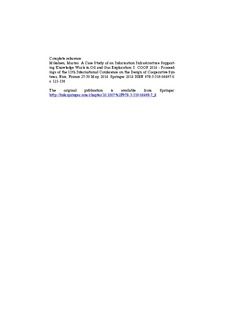| dc.contributor.author | Mikalsen, Marius | |
| dc.date.accessioned | 2014-09-23T09:40:53Z | |
| dc.date.accessioned | 2015-03-26T15:15:14Z | |
| dc.date.available | 2014-09-23T09:40:53Z | |
| dc.date.available | 2015-03-26T15:15:14Z | |
| dc.date.issued | 2014 | |
| dc.identifier.isbn | 978-3-319-06497-0 | |
| dc.identifier.uri | http://hdl.handle.net/11250/280284 | |
| dc.description.abstract | It is well rehearsed in the fields of CSCW and IS that the relationship between the social and the material is bi-directional and shaped locally. But what happens when knowledge work is stretched across space and time, and the practice of today relies on actions and reflections done elsewhere and at different times? This paper presents an on-going case study of oil and gas exploration that takes steps to shed light on this emerging issue. I argue the relevance of framing the process of generating interpretations in oil and gas exploration in terms of information infrastructures. The case is representative for other cases where practitioners’ reflections cannot immediately be confirmed by empirical observation. Through a discussion on the concepts of coordination and accumulation across the dimensions of space and time, I outline how an able information infrastructure in this domain must balance the dualism of the concepts of naturalisation and historification. | nb_NO |
| dc.language.iso | eng | nb_NO |
| dc.title | A Case Study of an Information Infrastructure Supporting Knowledge Work in Oil and Gas Exploration | nb_NO |
| dc.type | Chapter | nb_NO |
| dc.type | Peer reviewed | |
| dc.date.updated | 2014-09-23T09:40:53Z | |
| dc.description.version | acceptedVersion | |
| dc.identifier.doi | 10.1007/978-3-319-06498-7_8 | |
| dc.identifier.cristin | 1154559 | |
| dc.relation.project | Norges forskningsråd: 213115 | nb_NO |
